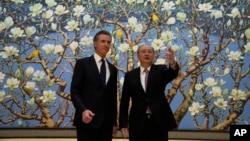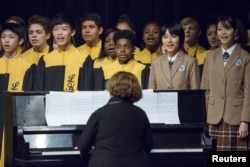As Washington and Beijing move cautiously to mend frayed relations, China is working to boost people-to-people ties, which saw a dramatic decline during the COVID pandemic.
Since last fall, China has hosted mayors from more than two dozen sister cities amid a renewed push to rebuild contacts with the 284 cities and states that Beijing says it maintains. The push kicked off with a visit by California Governor Gavin Newsom to China and began picking up steam around the time of last year’s meeting between President Joe Biden and Xi Jinping.
Xi, the Chinese president, is also spearheading an effort to bring 50,000 students to China over the next five years.
Last month, a group of high school students from Muscatine, Iowa, visited China. Another group from Tacoma, Washington, will visit its sister city of Fuzhou in southern Fujian province in March.
Xi’s push for more sister-city engagement comes as the number of students studying in China dropped to just 350 in 2022 compared with around 15,000 six or seven years ago. The number increased slightly to 700 in 2023.
It also comes as foreign businesses in China are struggling with slumping confidence, a slowing economy and unpredictable official behavior, including raids and the expansion of an anti-spy law.
Some worry that the push is part of an effort to regain control of the narrative and draw attention away from bigger concerns such as China’s military aggression toward Taiwan or in the South China Sea, or its human rights abuses and handling of Xinjiang, Tibet and Hong Kong.
Others see it as a necessary part of keeping the lines of communication open and building understanding.
In October, Kim Norton, the mayor of Rochester, Minnesota, joined one of the first groups to visit. He told VOA that memories of the trip are still fresh in his mind, and that many sister city relationships were rekindled during the visit.
"It was a great experience. Everyone we met was very nice to us," Norton said. "I really enjoyed meeting the Chinese people, experiencing Chinese cities and understanding the local culture and issues related to climate change."
Others who participated in the visit included Jim Brainard, the retired mayor of Carmel, Indiana; Barbara Buffaloe, mayor of Columbia, Missouri; Lee Harris, mayor of Shelby County, Tennessee; Chokwe Lumumba, mayor of Jackson, Mississippi; and Robyn Tannehill, mayor of Oxford, Mississippi.
During the visit, which was organized by the United States Heartland China Association, a sister city contract was signed twinning Carmel, Indiana, with Xiangyang in Hubei Province.
The mayoral delegation visited five cities: Hong Kong, Wuhan, Nanjing, Suzhou and Shanghai; test-drove electric vehicles produced by China Lantu Company; met with students from Wuhan University; watched a performance of the Suzhou Symphony Orchestra; and participated in the China International Import Expo.
Jessica Bissett, director of leadership programs at the National Committee on U.S.-China Relations, said local government level exchanges have become a new trend. "When U.S.-China relations are tense, state and provincial governments, especially municipal governments, have more leeway to decide what kind of exchanges and cooperation are best for local economic development," she said.
"Governors, mayors, their biggest responsibilities are to grow their economies and to make sure that their constituents have enough jobs and that they can have the best quality of life as possible,” said Bissett.
“So ... if U.S.-China economic relations would benefit their constituents, their towns, their states or their cities, then they're going to look into potential opportunities."
She said that for Chinese local governments, last year's economic downturn has also created incentive for such exchanges. She added that the U.S. State Department is also happy to see this kind of active exchange between local governments.
"The State Department now has a special unit that is focusing on sub-national relations,” Bissett said. “I think they would be encouraging things that are happening right now.”
VOA’s Mandarin Service reached out to the Chinese Embassy in Washington for comments but did not receive a response.
Given the heightened national security concerns in both countries, pushing forward local government level cooperation has its challenges.
Li Jing, director of an investment institution in Shandong Province who requested that a pseudonym be used so he could speak more freely with VOA Mandarin, said that before the U.S.-China trade war, he often helped to invite U.S. local government officials, entrepreneurs, university scholars and well-known young entrepreneurs visit Shandong Province.
He said he would help Chinese to make capital investments in American companies, and American companies to establish operations in China and participate in project development. Such delegations used to be held several times a year, he said.
Due to the U.S.-China trade war and the pandemic, such delegations were suspended for several years. Last year, he wanted to restart such activities but encountered many difficulties.
"Some [U.S.] companies were worried that after taking Chinese capital, their market development in the U.S. and other Western countries will be hindered, and they may even be sanctioned by the Western governments," he said. "Some American university professors are also worried about the consequences of cooperation with China. It may affect their work in the U.S."
He said that although most Americans he contacted were still interested in the Chinese market, they were also worried about the national security risks of cooperating with the Chinese government or accepting Chinese capital.
Gordon Chang, a distinguished senior fellow at the Gatestone Institute think tank, believes that such exchanges should be stopped.
"China's Communist Party is determined and relentless. It uses every point of contact with America to take down our country. That means every point of contact, no matter how innocent looking, is dangerous to us," Chang said.
Some have already responded to those concerns.
Shortly after retired Carmel Mayor Jim Brainard visited China and signed a new sister city relationship with Xiangyang, the city’s new mayor, Sue Finkham, announced this month that it was withdrawing its membership from the United States Heartland China Association, or USHCA, citing concerns about the group’s close ties to the Chinese Communist Party. Carmel, however, has not ended its sister city relationship with Xiangyang.
USHCA declined to respond to several requests from VOA for comment.
Mayor Norton said that while international politics was not the focus of his visit to China, the delegation cooperated with the U.S. State Department and the U.S. Embassy in China, understood the matters that needed attention in international relations, and ensured that the relationship between the local governments of the two countries would not cause conflicts at the level of national interests.
Bissett said local governments should be cautious about cooperation in high-tech and intellectual property fields. However, she said the two countries shouldn't use national security as an excuse to scrutinize everything.
“We need to give people more credit when they choose to engage with China and go on these trips and have faith in them that they can make the distinction for themselves,” she said.
Adrianna Zhang contributed to this report. This story originated in VOA's Mandarin Service.







